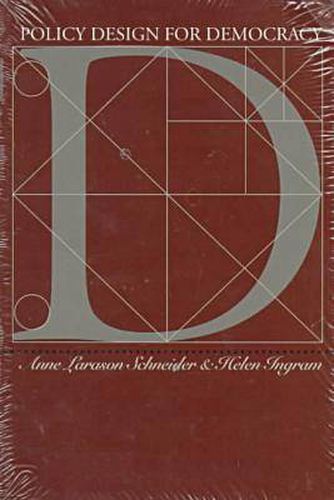Readings Newsletter
Become a Readings Member to make your shopping experience even easier.
Sign in or sign up for free!
You’re not far away from qualifying for FREE standard shipping within Australia
You’ve qualified for FREE standard shipping within Australia
The cart is loading…






How can democracy be improved in an age when people are profoundly disenchanted with government? Part of the answer lies in the design of public policy that unmistakenly works to advance citizenship by listening to, educating, and involving ordinary people. Rather than serve mainly the narrow interests of powerful groups who are socially constructed as deserving or issuing discipline and punishment to powerless people socially constructed as undeserving, public policy needs to advance citizenship, solve problems, pursue justice, and balance the interests of individuals with a concern for the collective good.
Policy Design for Democracy is a theoretically sophisticated work that draws examples from a wide array of public policy arenas. It summarizes four current approaches to policy theory-pluralism, policy sciences, public choice, and critical theory-and shows how none offers more than a partial view of the policy design characteristics that support and perpetuate democracy. Schneider and Ingram then develop a theory of public policymaking predicated on understanding how differences in policy designs are related to differences in the contexts from which they emerge and how these designs have an impact on democracy.
One of the first books to examine systematically the substantive aspects of public policy, Policy Design for Democracy is written clearly and with sufficient examples to make it easily understandable by undergraduates. Its linkage of public policy to citizenship is an important antidote to the overly technical and goal-driven orientation adopted by the policy sciences and public choice, and to the overly self-interested and strategic political games found in pluralist theory. Schneider and Ingram close by recommending a series of reforms that will improve policy designs and help restore citizen confidence in government.
$9.00 standard shipping within Australia
FREE standard shipping within Australia for orders over $100.00
Express & International shipping calculated at checkout
How can democracy be improved in an age when people are profoundly disenchanted with government? Part of the answer lies in the design of public policy that unmistakenly works to advance citizenship by listening to, educating, and involving ordinary people. Rather than serve mainly the narrow interests of powerful groups who are socially constructed as deserving or issuing discipline and punishment to powerless people socially constructed as undeserving, public policy needs to advance citizenship, solve problems, pursue justice, and balance the interests of individuals with a concern for the collective good.
Policy Design for Democracy is a theoretically sophisticated work that draws examples from a wide array of public policy arenas. It summarizes four current approaches to policy theory-pluralism, policy sciences, public choice, and critical theory-and shows how none offers more than a partial view of the policy design characteristics that support and perpetuate democracy. Schneider and Ingram then develop a theory of public policymaking predicated on understanding how differences in policy designs are related to differences in the contexts from which they emerge and how these designs have an impact on democracy.
One of the first books to examine systematically the substantive aspects of public policy, Policy Design for Democracy is written clearly and with sufficient examples to make it easily understandable by undergraduates. Its linkage of public policy to citizenship is an important antidote to the overly technical and goal-driven orientation adopted by the policy sciences and public choice, and to the overly self-interested and strategic political games found in pluralist theory. Schneider and Ingram close by recommending a series of reforms that will improve policy designs and help restore citizen confidence in government.